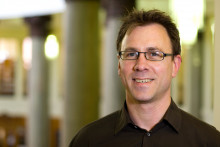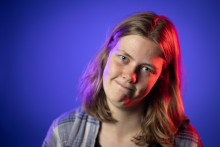The plot
Big Brother is watching you. In a dystopian and totalitarian society, set in the year 1984, the so-called ‘Party’ controls everything in one of the three super-states the world has: Oceania. Under the ideology of ‘IngSoc’ (English Socialism) and the mysterious leader Big Brother, the Party makes sure anyone who even thinks of opposing its regime disappears. To monitor people, this ruling class has everyone under constant surveillance, through so-called Telescreens placed in people’s homes, microphones, informers and the Thought Police.
The Party also controls the life of protagonist Winston Smith, who is a member of the middle class ‘Outer Party’ and a low-ranked employee at the Ministry of Truth. His job is to revise old newspaper editions to match the current ‘truth’ in the world. But Winston secretly opposes the Party’s rule and dreams of rebelling. Those feelings get even stronger when he falls in love with Julia, who also loathes the regime. But they both know their affair won’t have a happy ending…
First impression
Macnish: ‘I first read the book when I was twelve years old. That was during the Cold War, when I was living in West Berlin. Ironically, that was in the year 1984, when the book also rose in popularity. I picked it up, read it and loved it. I still love it on the third reading. You have to put it down for about an hour when you are done reading and contemplate it: that’s the power of this book. And it really shaped me as a person and how I view society. 1984 had a clear influence on me wanting to become a philosopher.’
Realism/feasibility
‘In a way, this book is now relevant as the history that never quite happened. Orwell, when he wrote the book in 1948, drew inspiration from the communist Soviet Union at that time, imagining what it would be like if it was deeply rooted in western society. That never happened, of course, partly because Marxism helped empower the middle and upper classes to stay in control by alerting them to the problems they faced.’
‘Thankfully, the real world is not as depressing as the book, but there are tons of parallels and similarities. Our society is not as stratified as the one in the book, but the class differences and the layers are still there, and change does not happen. For instance, when the banks crashed during the financial crisis there were only some minor riots while we all had to pay for the costs. Meanwhile the banks today are still run largely in the same way as before.’
‘One similarity I see is the application of the concept of doublethink: telling deliberate lies while genuinely believing in them. My fear is that the greatest success of the doublethink today is yet to come as people stop trusting the news. That’s the true masterstroke of fake news: creating distrust and flooding people with information. They don’t know what to believe anymore, so they have to either accept what they’re told or doubt everything, even news sources previously accepted as reliable.’
Stray observations
‘One of the strongest aspects of the book is the restriction of language in Oceania, by introducing a new language called Newspeak. Newspeak has restricted grammar and limited vocabulary. That’s a clever move to oppress people. If you reduce people’s vocabulary, you also restrict their freedom of thought.’
‘Speaking of dumbing things down, look at our everyday pop culture and the people we’re supposed to look up to. Even a show like Britain’s got Talent is manipulating you all the way through. There’s a danger in doing nothing else but enjoying stuff like that.’
‘Surveillance-wise, we don’t have Telescreens nowadays, but we do have smart TV’s, mobile phones and credit cards. So how are we not under constant wearable surveillance, mainly by big corporations? We have to deal with a kind of liquid surveillance that Orwell couldn’t even imagine seventy years ago.’
‘Aldous Huxley, the author of Brave New World, wrote a letter to Orwell after reading the book. Huxley said he was right in his book: if you want to rule over society, do it by seducing and coercing, not by brute force. For our western society, I think Huxley is right. Look at the technology we have, initially we are converted because of the benefits it has. But it soon becomes a necessity, like a self-imposed addiction.’
This article also appeared in our latest Science & Technology Magazine.







